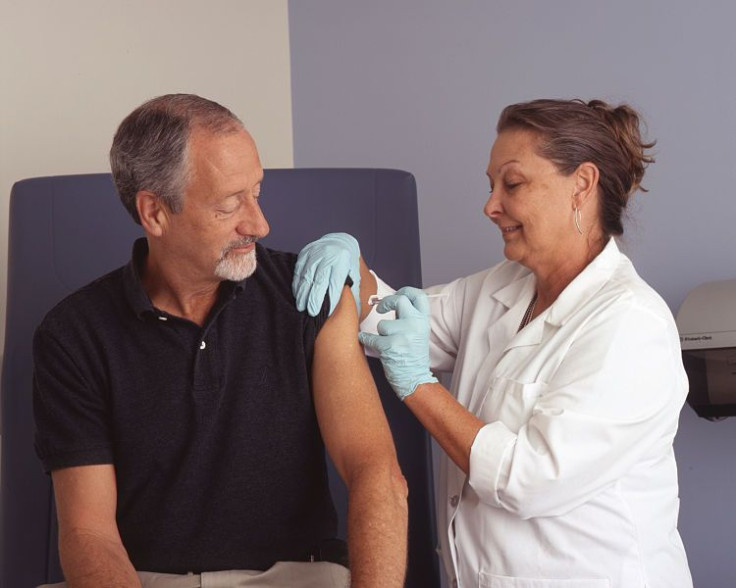Tdap, Whooping Cough Booster, Fails To Prevent Outbreaks; Doctor Says 'We Need A New Vaccine'

If you have a runny nose, a mild fever, and a dry cough, these symptoms mimic those of a common cold and are thought to be easily treatable with a healthy diet and bed rest. However, when common cold symptoms continue for two weeks and evolve into a persistent hacking cough, you will likely be diagnosed with whooping cough. Adults and adolescents who have received their immunity for pertussis, commonly known as whooping cough, are still susceptible to the virus in their lifetime because the acellular vaccines are known to fade more quickly.
According to the Centers for Disease Prevention and Control (CDC), there were more than 41,000 reported cases of whooping cough in the United States, including 18 deaths in 2012. Infants younger than three months of age account for the majority of whooping cough-related deaths. While the Advisory Committee on Immunization Practices (ACIP) has authorized physicians to highly recommend pregnant women to receive the Tdap vaccination, outbreaks of the virus still remain prevalent among adolescents and infants. During 2006 to 2011, California saw the highest occurrence of whooping cough in the last 50 years, which proves Tdap may be less effective than the original whole-cell pertussis vaccinations.
In a study published in the British Medical Journal, researchers assessed the effectiveness of the Tdap vaccine in 2005 to prevent outbreaks among adolescents and adults in California. Researchers used a compilation of data from the Kaiser Permanente Northern California for their sample size, which included 668 people age 11 and older with confirmed cases of whooping cough. These people were matched with 10,098 others who tested negative for the virus and 21,599 people who didn't get sick. The results of the study showed that 24 percent of those who were confirmed with whooping cough were previously immunized with Tdap; the highest numbers of pertussis infections were among those ages 11 to 14, who only received the acellular vaccines when they were younger. Dr. Roger Baxter, co-director of the Vaccine Study Center at Kaiser Permanente, and his colleagues also found that the vaccine was only 53 to 64 percent effective in preventing an outbreak, reports Yahoo.
"It's going to blunt those epidemics a little bit, but it's not going to be like the old whole-cell pertussis vaccine that really took those outbreaks away," said Baxter. "We expect that we will see these periodic outbreaks actually increase over the next few years as we reach a time that no one has had whole-cell vaccines." The shift from the original whole-cell vaccination to the acellular pertussis vaccine was concluded to be one with serious health consequences for the younger generation.
Whole-Cell Pertussis Vaccine Vs. Acellular Pertussis Vaccine
Baxter compared the original whooping cough vaccine to the recently new vaccine and found that its effectiveness has declined. The team of researchers in the study noted that the original vaccine contained whole pertussis bacteria, scientifically known as Bordetella pertussis, which attaches itself to the upper respiratory system and releases toxins that cause swelling, says the CDC. Unlike the original vaccination, acellular pertussis vaccine only contains a relative number of the bacteria cells of the disease that will produce the strongest immune system response in the body. With more and more people being injected with the Tdap, the outbreaks of whooping cough will continue to become more prevalent overtime because acellular pertussis vaccines generally fade more quickly.
But for now, "this is the best tool available and it clearly and definitely decreases your risk of getting whooping cough, it's a no-brainer," Dr. Paul Offit, director of the Vaccine Education Center at the Children's Hospital of Philadelphia, said to Reuters Health. However, Offit doesn't believe that this vaccine is the be-all and end-all. He is assured that a better vaccine for whooping cough is available out there. "But we would do better with a better vaccine, there's room for a better vaccine."
Booster Shots For Whooping Cough
While scientists look for a more effective vaccine to treat whooping cough, it is important to reduce your risk of infection by getting your booster shots. Mayo Clinic lists below when booster shots should be administrated to adolescents, adults, and pregnant women:
- Adolescents. Because immunity from the pertussis vaccine tends to wane by age 11, doctors recommend a booster shot at that age to protect against whooping cough (pertussis), diphtheria, and tetanus.
- Adults. Some varieties of the every-10-year tetanus and diphtheria vaccine also include protection against whooping cough (pertussis). In addition to protecting you against whooping cough, this vaccine will also reduce your risk of transmitting whooping cough to infants.
- Pregnant women. The CDC now recommends that pregnant women receive the pertussis vaccine between 27 and 36 weeks of gestation. This may also give some protection to the infant during the first few months of life.
For tips on how to prevent and treat whooping cough naturally, visit Dr. Ramey's Center for Natural Healing.
Published by Medicaldaily.com



























